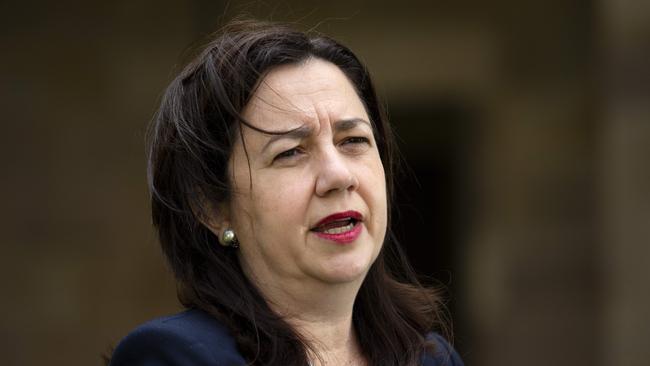
The virus is bequeathing deep and conflicting legacies — between culture and economics. This conflict will shape the next five years.
Its depth is now on almost frightening display as premiers in Queensland, Victoria and Western Australia beat the drum of an inward-looking provincialism, exploiting a risk-averse, protectionist, health-based isolation, promoting the notion of “each state for itself” and encouraging a chronic dependence on government unseen for decades.
It is an ugly form of pandemic protectionism, unimagined before COVID-19 struck. It offers a mostly dismaying insight into the political character of small-minded premiers under pressure. It mocks the vision many people believed in and perhaps took for granted — of an Australia united by commerce, people movement and a shared ethos, a big country that transcended six self-interested states.
In Queensland, Annastacia Palaszczuk, runs a closed-border policy driven by politics, using health as her smokescreen excuse — one of the worst political hoaxes in memory. In Victoria, Daniel Andrews imposes an unprecedented cost on his state’s jobs, economy and human capital in the cause of a health strategy he has singularly failed to justify. In Western Australia, Mark McGowan plays to the west’s worst delusions in championing the ideology “of an island within an island”.
As smart politicians, they will harvest the votes from self-interested deeds. They will gain and Australia will lose. How much we lose and how long their provincialism prevails defies prediction, the answer probably being as long as it serves their electoral interests.
In the process several confused narratives are taking shape — the spectacular resurrection of state populism; the power of COVID-19 in driving people to home, family and the bedrock appreciation of security in all its forms, from income to health; a deeper awareness of human vulnerability and more respect for those who maintain essential services; an appreciation of regional distinctiveness; the revelation of the authoritarian streak in progressivism; and more dependence upon state intervention, protection and government finances to sustain lives.
Some of trends should be constructive. The risk, however, is that the cultural legacy from COVID-19 will undermine the economic challenge that it bequeaths. The task facing Scott Morrison and Josh Frydenberg is judging the rate at which they withdraw JobKeeper funds in favour of public policy to reignite the private sector, jobs and investment. This is the fundamental question for the recovery.
It is asking Australians to crawl out from under the doona and emerge from the COVID-19 shadow. It means, over time, operating in a far tougher economic environment that tests personal resilience, demands greater investment, different work practices, a shift in the economic structure, the move to a more digitally orientated economy, new thinking on energy, tax, industrial relations and supply chains.
That requires a political culture based on confidence, teamwork, enterprise, mutual support and an outward-looking mentality. The jury is out on how the pandemic will change our political culture. Hopefully, the recent performance of some premiers will be the worse we witness.




Australia now faces a struggle between its erupting populist provincialism and the imperative for a robust, resilient economic recovery to combat the predicted 10 per cent unemployment level.